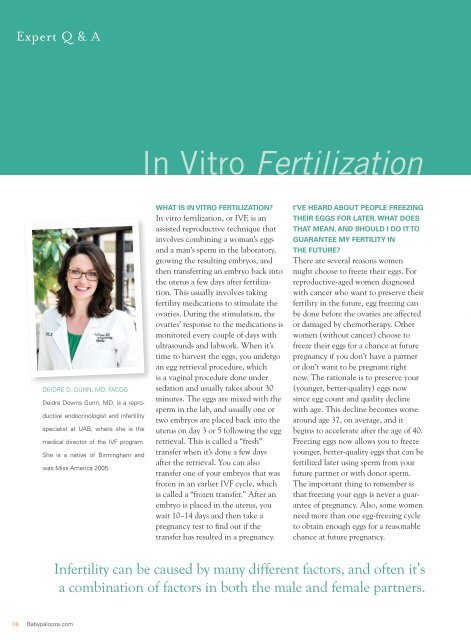Babypalooza Summer 2019
You also want an ePaper? Increase the reach of your titles
YUMPU automatically turns print PDFs into web optimized ePapers that Google loves.
Expert Q & A<br />
In Vitro Fertilization<br />
BY MEGHAN RATLIFF<br />
DEIDRE D. GUNN, MD, FACOG<br />
Deidre Downs Gunn, MD, is a reproductive<br />
endocrinologist and infertility<br />
specialist at UAB, where she is the<br />
medical director of the IVF program.<br />
She is a native of Birmingham and<br />
was Miss America 2005.<br />
WHAT IS IN VITRO FERTILIZATION?<br />
In vitro fertilization, or IVF, is an<br />
assisted reproductive technique that<br />
involves combining a woman’s eggs<br />
and a man’s sperm in the laboratory,<br />
growing the resulting embryos, and<br />
then transferring an embryo back into<br />
the uterus a few days after fertilization.<br />
This usually involves taking<br />
fertility medications to stimulate the<br />
ovaries. During the stimulation, the<br />
ovaries’ response to the medications is<br />
monitored every couple of days with<br />
ultrasounds and labwork. When it’s<br />
time to harvest the eggs, you undergo<br />
an egg retrieval procedure, which<br />
is a vaginal procedure done under<br />
sedation and usually takes about 30<br />
minutes. The eggs are mixed with the<br />
sperm in the lab, and usually one or<br />
two embryos are placed back into the<br />
uterus on day 3 or 5 following the egg<br />
retrieval. This is called a “fresh”<br />
transfer when it’s done a few days<br />
after the retrieval. You can also<br />
transfer one of your embryos that was<br />
frozen in an earlier IVF cycle, which<br />
is called a “frozen transfer.” After an<br />
embryo is placed in the uterus, you<br />
wait 10–14 days and then take a<br />
pregnancy test to find out if the<br />
transfer has resulted in a pregnancy.<br />
I’VE HEARD ABOUT PEOPLE FREEZING<br />
THEIR EGGS FOR LATER. WHAT DOES<br />
THAT MEAN, AND SHOULD I DO IT TO<br />
GUARANTEE MY FERTILITY IN<br />
THE FUTURE?<br />
There are several reasons women<br />
might choose to freeze their eggs. For<br />
reproductive-aged women diagnosed<br />
with cancer who want to preserve their<br />
fertility in the future, egg freezing can<br />
be done before the ovaries are affected<br />
or damaged by chemotherapy. Other<br />
women (without cancer) choose to<br />
freeze their eggs for a chance at future<br />
pregnancy if you don’t have a partner<br />
or don’t want to be pregnant right<br />
now. The rationale is to preserve your<br />
(younger, better-quality) eggs now<br />
since egg count and quality decline<br />
with age. This decline becomes worse<br />
around age 37, on average, and it<br />
begins to accelerate after the age of 40.<br />
Freezing eggs now allows you to freeze<br />
younger, better-quality eggs that can be<br />
fertilized later using sperm from your<br />
future partner or with donor sperm.<br />
The important thing to remember is<br />
that freezing your eggs is never a guarantee<br />
of pregnancy. Also, some women<br />
need more than one egg-freezing cycle<br />
to obtain enough eggs for a reasonable<br />
chance at future pregnancy.<br />
Infertility can be caused by many different factors, and often it’s<br />
a combination of factors in both the male and female partners.<br />
16 <strong>Babypalooza</strong>.com









